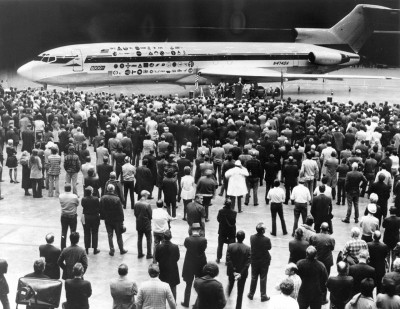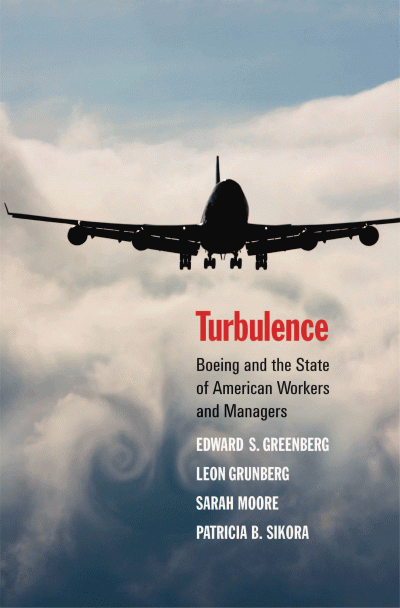Professors Leon Grunberg and Sarah Moore give a free, public talk:
Regester Lecture, 7:30 p.m. Thursday, Nov. 13
TACOMA, Wash. – The story of The Boeing Company is in many ways the story of corporate America. A world-beating company that thrived on pride, hard work, and loyalty suddenly faced a “new reality” in the 1990s that sent a shock rippling throughout the firm. Over the past few decades that same shock wave has reverberated throughout corporate America and reshaped much of it. It is called “shareholder value,” or maximizing short-term returns.
Leon Grunberg and Sarah Moore, who co-wrote one book on Boeing and are working on a second, have been researching Boeing Commercial Airplanes, the firm’s Seattle-based construction arm, for almost two decades. On Thursday, Nov. 13, they will deliver the University of Puget Sound Regester Lecture, with a talk titled, “Say Goodbye to All That: Emerging From Turbulence at Boeing.”The 7:30 p.m. lecture is free and open to the public, and will take place in the Tahoma Room of Commencement Hall. A link to a map of campus is below.
Grunberg, professor emeritus of sociology, and Moore, professor of psychology, at Puget Sound, studied Boeing from an unusual point of view: that of the employees. They interviewed and polled hundreds of workers and middle managers at key times in the company’s 20-year transformation. They also spoke to top executives.What they found, the researchers wrote, was a company, founded in 1916 by Bill Boeing, that had “moved away from an engineering, family-like atmosphere … to a more extreme, short-term profit emphasis [that] reflected a profoundly new way of doing business.”
The earlier “Boeing family,” where workers “cultivated strong emotional ties with their co-workers, supervisors, and, indeed, the airplanes they built,” was slowly dismantled, as a merger with McDonnell Douglas and new global competition changed the game. The shift undermined workers’ job security, morale, and even their health. Unfortunately for Boeing, it also had unplanned effects. The company’s radical outsourcing of the 787 Dreamliner and a brand new assembly line in South Carolina led to massive problems—including a three-year delay in delivering the much-heralded airplane.
In the 2010 book, Turbulence: Boeing and the State of American Workers and Managers, co-written with Edward Greenberg and Pat Sikora of University of Colorado Boulder, the authors described their findings in detail. Then, in 2011, Grunberg and Moore returned to Boeing and interviewed more than 85 retired, long-term, and newly-hired employees.In their upcoming lecture the two researchers will reveal how employees have adapted to the new regime. They will discuss their findings—about the effect of long-term stress and compromised trust in leadership; about the reactions among different generations of staff; and about how employees now find meaning in their work and how they view the new social contract.
Grunberg and Moore have collaborated since 1996, twice receiving funding from the National Institutes of Health to investigate the health and well-being effects of organizational change. Together they have published more than two dozen articles, made numerous presentations at professional conferences, and involved many students in their data collection, analysis, and publication. They are currently working on a second book that describes the varied ways in which both veteran and new employees engage in their work in Boeing’s post-merger culture.
Leon Grunberg is professor emeritus of sociology in the Department of Sociology and Anthropology. For more than 30 years he has studied large and mid-size organizations, focusing especially on the effects of their actions on employee behavior and attitudes. His research has examined multinational companies in Europe, participatory workplaces in the United States, the impact of management-employee relations on productivity and safety, and the effects of corporate restructuring on the attitudes and well-being of employees. Grunberg served as department chair for 13 years and was honored with the President’s Excellence in Teaching Award in 2001.
Sarah Moore is professor and chair of the Department of Psychology. Since joining the faculty in 1993, she has researched the effects of various job characteristics and of workplace stress—caused by layoffs, corporate re-engineering, and other actions—on employee health, attitudes, and performance. Moore also has investigated work-home integration and conflict, stress experienced by managerial women, and generational work differences and similarities. She received the Thomas A. Davis Teaching Excellence Award on three occasions and served as associate dean of faculty from 2007 to 2013.
John D. Regester Faculty Lecture: The annual address was established in 1965 to honor John D. Regester, who joined the Puget Sound faculty in 1924. It is given by a faculty member who exemplifies the qualities of scholarship and intellectual integrity that were long associated with the former dean and philosophy professor.
For directions and a map of the University of Puget Sound campus:pugetsound.edu/directions.
For accessibility information please contact accessibility@pugetsound.edu or 253.879.3236, or visit pugetsound.edu/accessibility.
Press photos of Leon Grunberg and Sarah Moore can be downloaded from: pugetsound.edu/pressphotos.
Photos on page: Top right: Leon Grunberg and Sarah Moore, by Ross Mulhausen; Above left: The one thousandth Boeing 727 to be built on the Renton factory floor, 1974; Above right: Turbulence book.
Tweet this: #Boeing workers:then and now. “Goodbye to all That,” a free talk by Leon Grunberg & Sarah Moore @univpugetsound Nov. 13 http://is.gd/eRUkvh
Follow us on Twitter! twitter.com/univpugetsound




